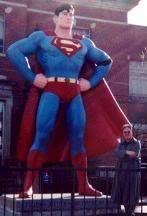| Pop Culture Gadabout | ||
|
Sunday, March 23, 2008 ( 3/23/2008 10:26:00 AM ) Bill S. WICKER WORK: This weekend, our local cable company has been offering preview HBO, so we decided to take advantage of the deal by catching Neil LaBute's remake of the The Wicker Man last night. It was an apt choice for an Easter weekend, we thought. Though admirers of the original have largely panned the remake, watching this born-again version somehow seemed right to our heathen selves. Unfortunately, LaBute's remake turned out to be every bit as wrongheaded as we previously heard. To those unfamiliar with either movie, Man centers on a policeman (Edward Woodward in the original; Nicholas Cage in the remake) who is lured to an isolated island in search of a missing little girl. The isle turns out to be a close-knit rural community whose inhabitants practice a proudly pagan, earth-centered religion. As our representative of modern civilized law investigates further, he becomes convinced that the island residents have sinister plans for the still missing girl Rowan. He's mistaken, however, and this error will prove his own undoing. Original screenwriter Anthony (Sleuth, Frenzy) was a skilled hand at messing with his audience, and in the 1975 version of Wicker Man, he pulled this off big time. Making Woodward's Sgt. Howie a rigidly old-fashioned Christian, he played the character's stiff-upper-lip self-righteousness against the sexier, rowdier denizens of Summerisle led by Christopher Lee's urbane Lord Summerisle. Watching Woodward tromp around judgmentally as he comes up against, for instance, Diane Cilento's schoolteacher after she's explained the phallic symbolism of the maypole to a group of young schoolchildren, you can't help but side with the more open villagers - until you realize what they do to maintain their hedonist traditions. Though it all ends horribly for Sgt. Howie, the movie still affords him a final moment to state his case. And in at least one story matter, we know that he's in the right. In contrast, writer/director LaBute's Summersisle (note the extra "s" in the middle) primarily proves to be a forum for the writer's own long-standing observations of the battle of the sexes (cf. In the Company of Men). Now, there's nothing wrong with a writer slathering his own thematic concerns onto an already established work, provided he adds something new to the mix. But the best that Wicker Man 2.0 offers is retread bits from Harvest Home. LaBute's northwestern island has been transformed into a bee-keeping matriarchy run by Ellen Burstyn's Sister Summersisle (see how much more sibilant and unwieldy that extra "s" makes her name), and, unlike the original agrarian community, it proves anything but inviting. Where the original's villagers were seductive and engaging (none more than Britt Ekland's innkeeper's daughter), the new island community is tight-lipped and unwelcoming. At no point in the movie do we find ourselves thinking, "Hey, it looks like these folks are really tied into something," because the writer/director can't bother to show his villagers actively communing with the forces that they profess to worship. Nature, which is practically a character all itself in the original, is only incidentally noted in the remake. Cage's Edward Malus, meanwhile, proves too indistinct a character to fully engage our sympathies. Meant to stand in for All Men (where Woodward's Howie was a more specific breed of English Christian), he's too unfocused to stand up against Burstyn's queen bee - and can only resort to repeated invocations of the law whenever he comes up against any of the other women of Summersisle. LaBute attempts to impose a personal dimension on the character by, first, providing our hero with a traumatic event in this past and then excessively flashing back to it and, second, by making one of the Summersisle women (Kate Beahan's Sister Willow) an ex-lover. (Which ultimately makes the missing Rowan . . . guess what?) Both choices only serve to further flatten Schaffer's original construction. Could've been intriguing - in an era where religio conflict has had an even more palpable influence on our national discourse - if the current Wicker Man had something to say about our present-day anxieties re: group belief. But, unfortunately, LaBute is too invested in erecting feminazi straw women to do anything so provocative. Next year, it's back to the original on DVD for our spring viewing. UPDATE: In the interest of record-straightening, Abshire notes that producer Nic Cage reportedly had a heavy hand in movie rewrites - and is to blame for an especially ludicrous scene where his cop hero commandeers a bicycle at gunpoint. # | |
|
|

